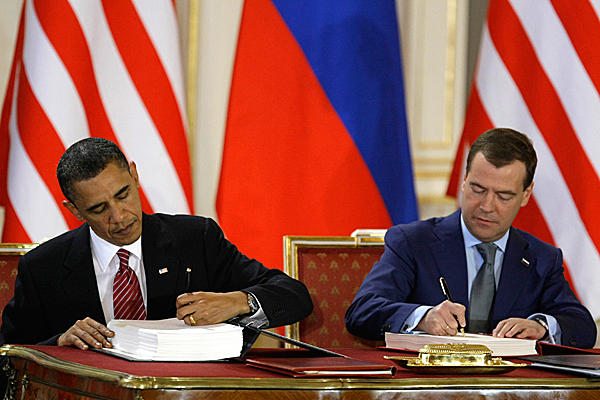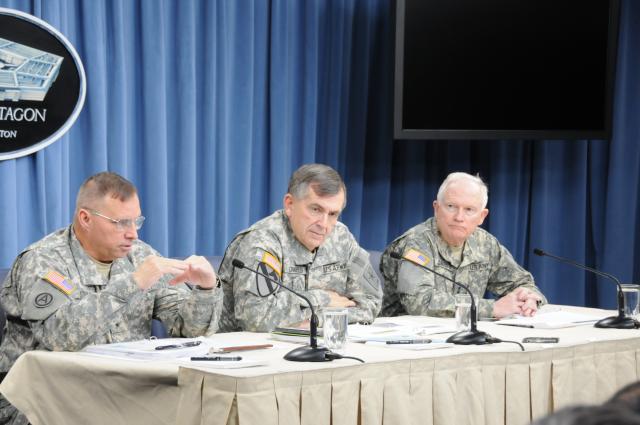With one major arms reduction treaty nearly to the enforcement stage, more work lies ahead to advance the nation’s nuclear security, a senior State Department official said Jan. 19.
Rose Gotemoeller, the State Department’s assistant secretary for the Bureau of Arms Control, Verification and Compliance, spoke about that work at the National Academy of Sciences and U.S. Institute of Peace Symposium.
The Senate ratified the New Strategic Arms Reduction Treaty on Dec. 20, and the treaty will be in force after the Russian Duma and Federation Council approve the treaty and the two nations formally exchange instruments of ratification.
“New START is the most significant nuclear arms control agreement in nearly two decades,” Ms. Gotemoeller said.
The treaty limits the number of strategic nuclear weapons and launchers that the United States and Russia can deploy, she said, while maintaining the effectiveness of the U.S. nuclear deterrent.
After New START comes into force, Ms. Gotemoeller said, an initial exchange of data on missiles, launchers, heavy bombers and warheads subject to the treaty is required within 45 days. The right to conduct on-site inspections begins after 60 days.
The new treaty sets the stage for progress in other critical areas on the nuclear arms control agenda, she said: further nuclear weapons reductions, the Fissile Material Cutoff Treaty, and the Comprehensive Nuclear Test Ban Treaty.
The Senate passed a resolution of advice and consent in ratifying New START that calls for the U.S. officials to initiate negotiations with Russia on nonstrategic nuclear weapons within the treaty’s first year, she said. Work to prepare for that dialogue is under way and intensifying, she added.
More progress occurred last week, Ms. Gotemoeller said, when John R. Beyrle, the U.S. ambassador to the Russian Federation, and Russian Deputy Foreign Minister Sergey Ryabkov exchanged diplomatic notes to formalize the so-called “123 Agreement.”
“This is an agreement for nuclear cooperation which both sides have been intent on bringing into force for some time,” she said.
The agreement, formally called the Agreement for Cooperation in the Field of Peaceful Uses of Nuclear Energy, enhances cooperation on global nonproliferation goals, Gotemoeller said.
“The 123 Agreement will create the conditions for improved cooperation on joint technology development to support arms control and nonproliferation activities,” she said.
Ms. Gotemoeller said the agreement will advance joint efforts to convert research reactors from highly-enriched uranium to low enriched uranium fuel; aid cooperation on forensic analysis, allowing better identification of nuclear material and preventing that material from reaching terrorists; and set the stage for expanded joint technical cooperation on next-generation international safeguards.
There are two other critical elements to President Barack Obama’s arms control agenda, she said: the Fissile Material Cutoff Treaty and the Comprehensive Nuclear-Test-Ban Treaty.
Secretary of State Hillary Rodham Clinton has emphasized, Ms. Gotemoeller said, that the U.S. stands ready to begin multilateral negotiations immediately on a fissile material treaty at the Conference on Disarmament in Geneva.
Such a treaty would prohibit production of fissile material for use in nuclear weapons.
“This set of treaty negotiations is long overdue, and it is an important step on the international arms control agenda,” Ms. Gotemoeller said. “The United States is deeply disappointed over the Conference on Disarmament’s failure to begin negotiations.”
The conference’s next session will start this month, she said, and she and other U.S. representatives will work with other interested states on ways to move the fissile materials treaty agenda forward.
Finally, the test-ban treaty remains an important element of the president’s strategy to strengthen the nuclear nonproliferation regime and create the conditions for a nuclear free world, she said.
The Senate declined to ratify the test-ban treaty in 1999, based on concerns about its verifiability and the reliability of America’s nuclear deterrent without nuclear testing, Ms. Gotemoeller said. Over the last decade, the U.S. has made strides in meeting both concerns, she added.
“The International Monitoring System is now more than 80 percent complete. At the time of the initial Senate vote on the Treaty in 1999, none of the IMS stations had been certified as meeting approved technical specifications and operational requirements,” she said.
The nation can also now ensure the reliability of its nuclear weapons without resorting to explosive testing, Ms. Gotemoeller said.
“After an absence of eight years, U.S. experts are fully engaged in preparatory work to establish the on-site inspection element of the verification regime, as part of the U.S. contribution to the work of the Comprehensive Test Ban Treaty Organization,” she said.
“These actions demonstrate the commitment of the United States to prepare for the entry into force of this treaty,” she continued. “We will continue to take additional steps to reinforce the norm against nuclear testing in the months ahead.”
The nuclear arms control agenda’s “monitoring, transparency, and verification challenges alone are daunting,” she acknowledged.
“We have talent available to address those challenges that is also quite formidable,” Ms. Gotemoeller said, “and a welcome partnership with the scientific community in the U.S., Russia and elsewhere to tackle these challenges.”











